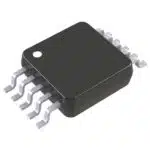
Selecting the right inductor is essential for ensuring the performance and reliability of automotive systems. Bourns® products include surface-mount chip inductors specifically designed to meet the rigorous demands of modern vehicles. These components are crucial for reducing ripple voltage, managing saturation current, and suppressing electromagnetic interference (EMI) in sensitive circuits. Through rigorous testing, including accelerated thermal aging and mechanical stress analysis, these inductors demonstrate exceptional durability and efficiency under extreme conditions. With AEC-Q200 compliance, Bourns chip inductors, power chokes, and chip beads provide unparalleled reliability, making them a vital choice for high-performance automotive applications.
Key Takeaways
-
Picking the right inductor is important for car systems. It keeps them efficient, reliable, and with steady voltage output.
-
Bourns® inductors are great at blocking electromagnetic interference (EMI). This helps circuits work well without problems.
-
These inductors are small and strong, perfect for tight spaces in cars. They are built to handle physical stress.
-
Bourns® inductors meet AEC-Q200 standards. This means they work well even in tough car conditions.
-
Choosing the right inductance and current rating is key. It helps energy flow better and reduces signal problems in car circuits.
Key Features of Bourns® Products Include Surface-Mount Chip Inductors
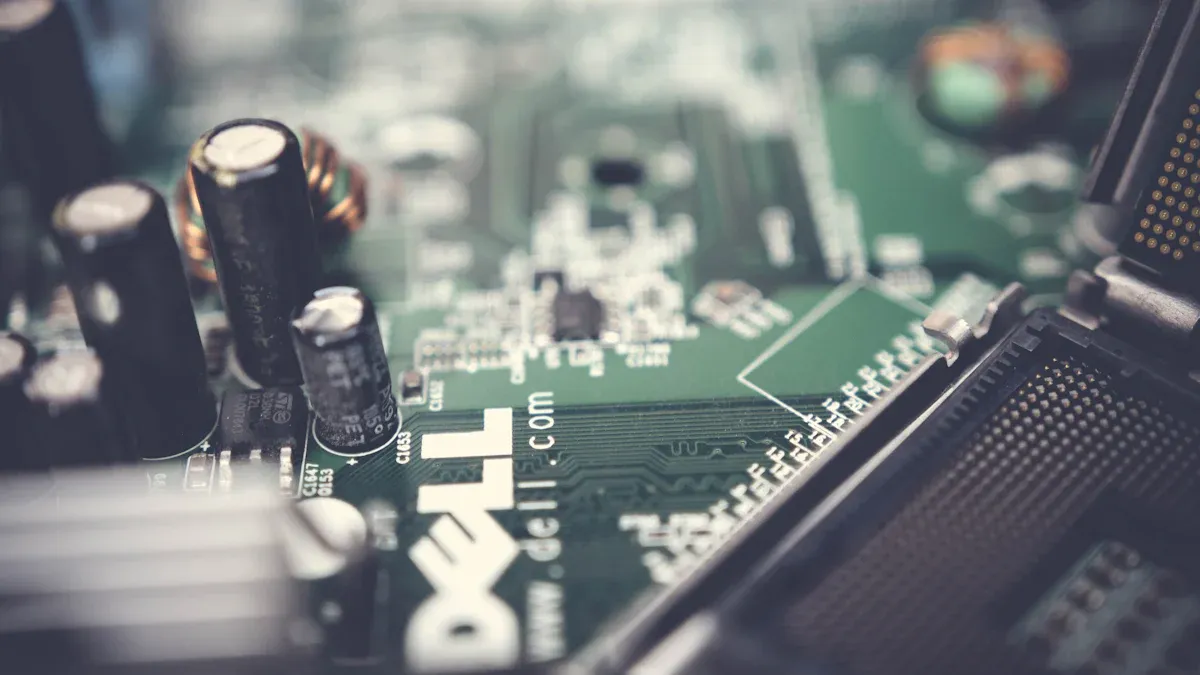
High EMI Suppression Capabilities
Bourns® products include surface-mount chip inductors that excel in suppressing electromagnetic interference (EMI), a critical requirement for automotive applications. These inductors effectively reduce noise in sensitive circuits, ensuring stable and reliable system performance. Experimental data highlights their ability to minimize EMI spikes, particularly at frequencies of 167 MHz and 30 MHz.
-
The addition of a common mode inductor reduces the current coefficient (KI) and electric field intensity coefficient (KE) by approximately 13 dB.
-
At 167 MHz, noise levels meet the FCC Class B radiated EMI standard, ensuring compliance with stringent regulatory requirements.
-
These inductors demonstrate significant noise suppression capabilities, although further optimization may be required for specific frequency ranges.
By incorporating these inductors, automotive systems can achieve enhanced signal integrity and reduced interference, even in high-speed communication environments.
Compact and Durable Design
Bourns® surface-mount chip inductors are engineered with a compact form factor and robust construction, making them ideal for space-constrained automotive systems. Their integrally molded metal alloy structure enhances durability, allowing them to withstand mechanical stress from impacts and bending.
|
Test Condition |
Result |
Description |
|---|---|---|
|
High Voltage Test |
Passed |
Withstands voltage transients up to 60 V/ns and 2 MHz frequency without damage. |
|
Thermal Aging |
Validated |
Long-duration tests confirm reliability under thermal stress. |
|
Mechanical Impact |
Resilient |
Metal alloy inductors resist bending and impact stress, outperforming ferrite inductors. |
These shielded power inductors also feature low DC resistance (DCR), which minimizes power loss and ensures efficient operation. Their compact dimensions, such as the SRF2012A-801Y model measuring just 2 x 1.2 x 1.2 mm, make them suitable for applications where space is at a premium.
Compliance with Automotive Standards
Bourns® products include surface-mount chip inductors that meet rigorous automotive standards, ensuring their reliability in demanding environments. These inductors comply with AEC-Q200, a globally recognized standard for passive components in automotive applications.
|
Compliance Standard |
Description |
|---|---|
|
AEC-Q200 |
Product validation standard for passive components. |
|
AEC-Q101 |
Product validation standard for integrated circuits. |
|
AEC-Q102 |
Product validation standard for discrete semiconductors. |
|
IATF 16949 |
Certification for quality management systems in automotive production. |
This adherence to industry standards guarantees that the inductors can withstand extreme temperatures, mechanical stress, and electrical transients. Their robust design and compliance make them a trusted choice for high-reliability automotive systems, including powertrain modules, infotainment systems, and advanced driver-assistance systems (ADAS).
Wide Range of Inductance Values and Current Ratings
Bourns® surface-mount chip inductors offer an extensive selection of inductance values and current ratings, making them suitable for a wide array of automotive applications. These inductors are designed to meet the specific requirements of modern vehicles, from low-power infotainment systems to high-current powertrain modules.
Versatility in Inductance Values
The inductance range of Bourns® chip inductors spans from microhenries (µH) to millihenries (mH), providing flexibility for engineers to optimize circuit performance.
-
Low Inductance Values: Ideal for high-frequency applications such as signal filtering and noise suppression.
-
Medium Inductance Values: Suitable for power management circuits and voltage regulation.
-
High Inductance Values: Perfect for energy storage and smoothing in powertrain systems.
Tip: Selecting the appropriate inductance value ensures efficient energy transfer and minimizes signal distortion in automotive circuits.
Broad Current Ratings
Bourns® inductors support a wide range of current ratings, accommodating both low-power and high-power applications.
|
Current Rating |
Application Example |
Benefit |
|---|---|---|
|
Up to 300 mA |
Infotainment and connectivity modules |
Reduced power loss and improved efficiency. |
|
300 mA – 1 A |
Advanced driver-assistance systems (ADAS) |
Reliable operation under moderate loads. |
|
Above 1 A |
Electric vehicle (EV) charging systems |
Enhanced durability for high-current environments. |
Optimized Performance Across Applications
The combination of varied inductance values and current ratings allows Bourns® inductors to deliver tailored solutions for diverse automotive systems. For example:
-
Powertrain Systems: High-current inductors ensure stable energy delivery to critical components.
-
Infotainment Modules: Low-inductance models maintain signal integrity in high-speed communication circuits.
-
ADAS: Medium-range inductors balance power handling and EMI suppression for sensitive electronics.
Note: Engineers should consult datasheets to match inductance and current specifications with system requirements for optimal performance.
Bourns® surface-mount chip inductors provide unmatched versatility, enabling automotive manufacturers to design systems that meet stringent performance and reliability standards. Their adaptability ensures compatibility with emerging technologies, including electric and autonomous vehicles.
Factors to Consider During Inductor Selection
Selecting the right inductor is a critical step in designing reliable and efficient automotive systems. Engineers must evaluate several factors to ensure optimal performance and compatibility with application requirements. Below are the key considerations for inductor selection.
Inductance Value and Frequency Range
Inductance plays a pivotal role in determining the performance of electronic circuits, especially in automotive applications. It directly influences energy storage, noise suppression, and signal integrity. Engineers must carefully match the inductance value with the operating frequency range of the circuit to achieve desired results.
|
Aspect |
Description |
|---|---|
|
Inductance Importance |
Inductance is crucial for electronic components in vehicles, especially with the shift to higher frequencies. |
|
Frequency Trends |
DC-DC converters are moving towards higher-frequency switching to enhance performance and reduce size. |
|
Automotive Performance |
Higher inductance values are necessary for improved reliability and performance in automotive systems. |
Modern automotive systems often operate at higher frequencies to reduce component size and improve efficiency. For instance, DC-DC converters now utilize high-frequency switching, making inductance a dominant factor in circuit design. Inductors with higher inductance values ensure better reliability and performance, particularly in noise-sensitive environments.
Tip: Engineers should prioritize inductance values that align with the frequency range of their application to minimize signal distortion and maximize energy transfer.
Current Rating and Power Handling
The current rating of an inductor determines its ability to handle electrical loads without overheating or saturating. Automotive systems, such as powertrain modules and electric vehicle (EV) charging systems, often require inductors capable of managing high currents while maintaining efficiency.
-
Low Current Ratings (Up to 300 mA): Suitable for infotainment and connectivity modules where power demands are minimal.
-
Medium Current Ratings (300 mA – 1 A): Ideal for advanced driver-assistance systems (ADAS) that require moderate power handling.
-
High Current Ratings (Above 1 A): Necessary for EV charging systems and powertrain applications where durability under high loads is critical.
Advancements in materials, such as graphene, have enabled the production of high-performance inductors that can handle higher currents while maintaining compact sizes. These innovations address challenges like thermal management and energy conversion efficiency, which are essential for modern automotive designs.
Note: Selecting an inductor with an appropriate current rating ensures efficient power handling and prevents thermal issues, enhancing the overall reliability of the system.
Physical Size and Mounting Options
Space constraints in automotive systems demand compact and versatile components. Inductors must fit within limited spaces while maintaining their performance and durability. Surface-mount technology (SMT) inductors, such as those offered by Bourns®, provide an excellent solution for space-constrained designs.
-
Compact Designs: Inductors like the SRF2012A-801Y model, measuring just 2 x 1.2 x 1.2 mm, are ideal for applications where space is at a premium.
-
Mounting Options: SMT inductors simplify assembly processes and improve mechanical stability, making them suitable for high-vibration environments.
The rise in EV power management solutions has further increased the demand for compact inductors. Multi-layer manufacturing techniques and advanced materials have enhanced the value of small inductors, enabling them to deliver high performance in limited spaces.
Tip: Engineers should consider both the physical size and mounting options of an inductor to ensure compatibility with their design and manufacturing processes.
Compatibility with Automotive Standards (e.g., AEC-Q200)
Automotive systems demand components that meet stringent quality and reliability standards. Bourns® surface-mount chip inductors comply with AEC-Q200, a globally recognized benchmark for passive electronic components in automotive applications. This qualification ensures that these inductors can withstand the harsh conditions often encountered in vehicles, such as extreme temperatures, mechanical vibrations, and electrical transients.
AEC-Q200 compliance involves rigorous testing to validate the durability and performance of inductors. These tests include thermal cycling, mechanical shock, and high-temperature storage, among others. By meeting these requirements, Bourns® inductors provide engineers with confidence in their reliability for critical automotive systems.
|
Inductor Series |
AEC-Q200 Qualification |
Application |
|---|---|---|
|
Accu-L® Series |
Yes |
Automotive Signal and Power Applications |
Note: AEC-Q200 compliance is essential for in-vehicle electronic components, as it ensures they meet the automotive industry’s high standards for stress resistance and reliability.
Bourns® inductors are designed to meet these rigorous standards, making them suitable for a wide range of applications, including powertrain systems, infotainment modules, and advanced driver-assistance systems (ADAS). Their adherence to AEC-Q200 ensures that they perform reliably under the demanding conditions of modern vehicles.
Thermal Performance and Reliability
Thermal performance is a critical factor in inductor selection for automotive applications. Bourns® surface-mount chip inductors are engineered to endure extreme temperature variations, ensuring consistent performance and long-term reliability. These inductors undergo extensive thermal testing to validate their durability and identify potential weak points in design and materials.
Key thermal performance tests include:
-
Temperature Cycling: Reveals defects by exposing inductors to rapid temperature changes, simulating real-world conditions.
-
Material Compatibility Evaluation: Prevents mechanical stress and failure caused by differing thermal expansion rates.
-
Electrical Performance Assessment: Examines changes in resistance, capacitance, or impedance under varying temperatures.
-
Lifespan Prediction: Simulates long-term thermal stressors to estimate product longevity.
Bourns® inductors excel in these tests, demonstrating their ability to maintain electrical performance and structural integrity even in harsh environments. For example, their low DC resistance (DCR) minimizes heat generation, enhancing efficiency and reducing thermal stress. This makes them ideal for high-power applications such as electric vehicle (EV) charging systems and powertrain modules.
Tip: Engineers should prioritize inductors with proven thermal reliability to ensure optimal performance and longevity in automotive systems.
By combining robust thermal performance with compliance to automotive standards, Bourns® inductors deliver unmatched reliability. These automotive-grade power inductors are a trusted choice for engineers designing systems that require high efficiency and durability.
Benefits of Using Bourns® Inductors in Automotive Applications
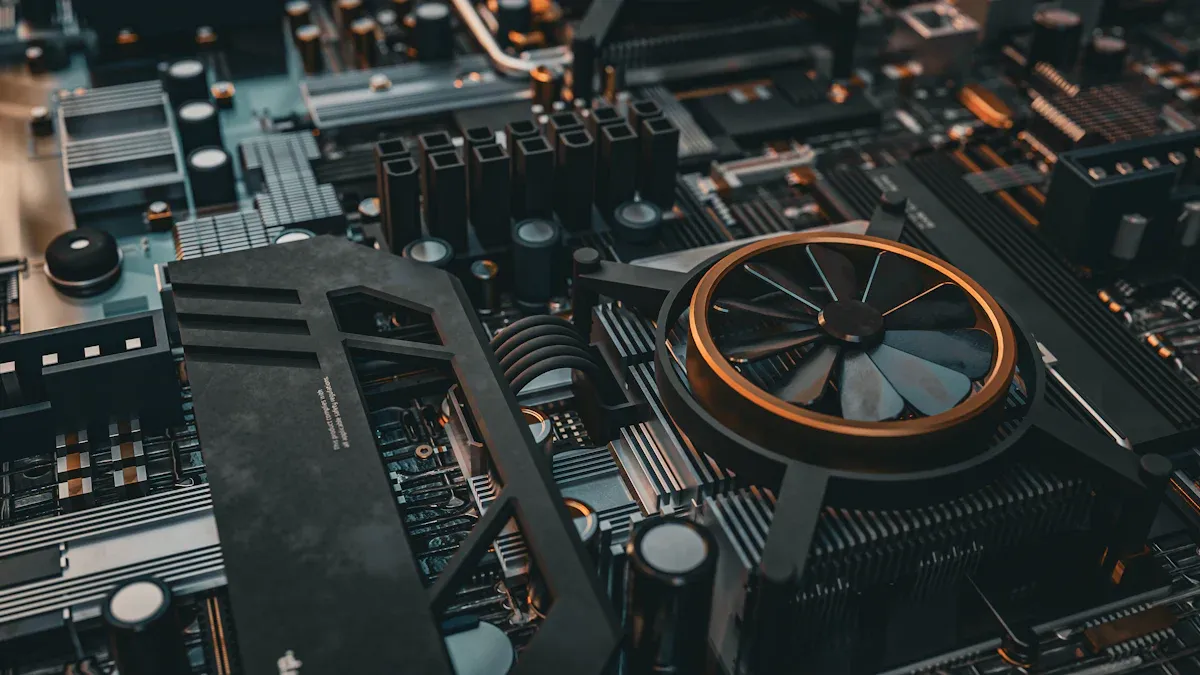
Enhanced System Performance and Efficiency
Bourns® inductors significantly enhance the performance and efficiency of automotive systems. Their advanced design ensures optimal energy storage, reduced power loss, and improved circuit functionality. Key performance metrics, such as inductance, saturation current, and quality factor (Q), highlight their contribution to system efficiency.
|
Performance Metric |
Description |
|---|---|
|
Inductance |
Measures the inductor’s ability to store energy; larger values can store more energy. |
|
Saturation Current |
Maximum current an inductor can withstand; exceeding this affects performance. |
|
Frequency Response |
Indicates performance at different frequencies; important for ensuring application requirements. |
|
Quality Factor (Q) |
Measures efficiency; higher Q indicates lower energy loss and better performance in circuits. |
For example, in a battery pack, these inductors ensure efficient energy transfer, minimizing heat generation and maximizing power delivery. This efficiency is critical for systems like the battery management system, where precise energy regulation is essential for optimal performance.
Improved EMI Suppression for Sensitive Electronics
Electromagnetic interference (EMI) can disrupt sensitive automotive electronics, leading to performance degradation. Bourns® inductors excel in suppressing EMI, ensuring stable operation in high-speed communication and power management systems. Simulation data and test reports validate their effectiveness in reducing noise levels across various frequencies.
|
Source |
Description |
|---|---|
|
Simulation data for automotive applications showing EMI suppression improvements. |
|
|
Tool for simulating inductor losses in automotive applications, relevant for EMI analysis. |
|
|
Application notes that may provide insights into inductor performance and EMI suppression. |
By integrating these inductors into automotive systems, engineers can protect critical components, such as the battery pack, from interference, ensuring reliable operation even in noisy environments.
Increased Reliability in Harsh Environments
Automotive systems often operate under extreme conditions, including high temperatures, mechanical stress, and electrical transients. Bourns® inductors undergo rigorous endurance and stability testing to ensure long-term reliability. These tests simulate real-world conditions, identifying potential issues early and ensuring consistent performance over time.
-
Endurance testing reveals weaknesses by simulating prolonged usage, uncovering issues like performance slowdowns.
-
Stability testing ensures the system remains dependable under extended operation, detecting gradual degradation.
-
Thermal cycling and material compatibility evaluations prevent failures caused by temperature fluctuations.
In applications like the battery pack and battery management system, these inductors maintain operational stability, even in harsh environments. Their robust design and proven reliability make them a trusted choice for automotive engineers.
Cost-Effectiveness and Longevity
Bourns® surface-mount chip inductors offer exceptional cost-effectiveness and longevity, making them a preferred choice for automotive engineers. These inductors combine advanced materials, efficient designs, and rigorous testing to deliver long-term value in demanding environments.
Key Factors Contributing to Cost-Effectiveness
-
Low Power Loss: The low DC resistance (DCR) of Bourns® inductors minimizes energy loss, reducing overall power consumption in automotive systems.
-
Reduced Maintenance Costs: Their robust construction and compliance with AEC-Q200 standards ensure reliable performance, lowering the need for frequent replacements.
-
Streamlined Manufacturing: Surface-mount technology (SMT) simplifies assembly processes, reducing production time and costs for manufacturers.
Tip: Selecting high-quality components like Bourns® inductors can significantly reduce the total cost of ownership in automotive systems.
Longevity in Harsh Conditions
Bourns® inductors are engineered to withstand extreme temperatures, mechanical stress, and electrical transients. This durability ensures consistent performance over extended periods, even in challenging automotive environments.
|
Feature |
Benefit |
|---|---|
|
High-Temperature Tolerance |
Maintains performance in environments exceeding 125°C. |
|
Mechanical Resilience |
Resists vibrations and impacts, ensuring stability in high-stress systems. |
|
Corrosion Resistance |
Protects against environmental factors, extending product lifespan. |
Long-Term Value for Automotive Applications
The combination of cost-efficiency and durability makes Bourns® inductors a smart investment for automotive manufacturers. Their extended lifespan reduces the need for replacements, while their energy-efficient design contributes to lower operational costs. These features align with the industry’s growing focus on sustainability and long-term reliability.
Note: Engineers should evaluate both upfront costs and long-term savings when selecting inductors for automotive systems. Bourns® inductors deliver on both fronts, ensuring high performance and value over time.
Application Examples of Bourns® Products Include Surface-Mount Chip Inductors
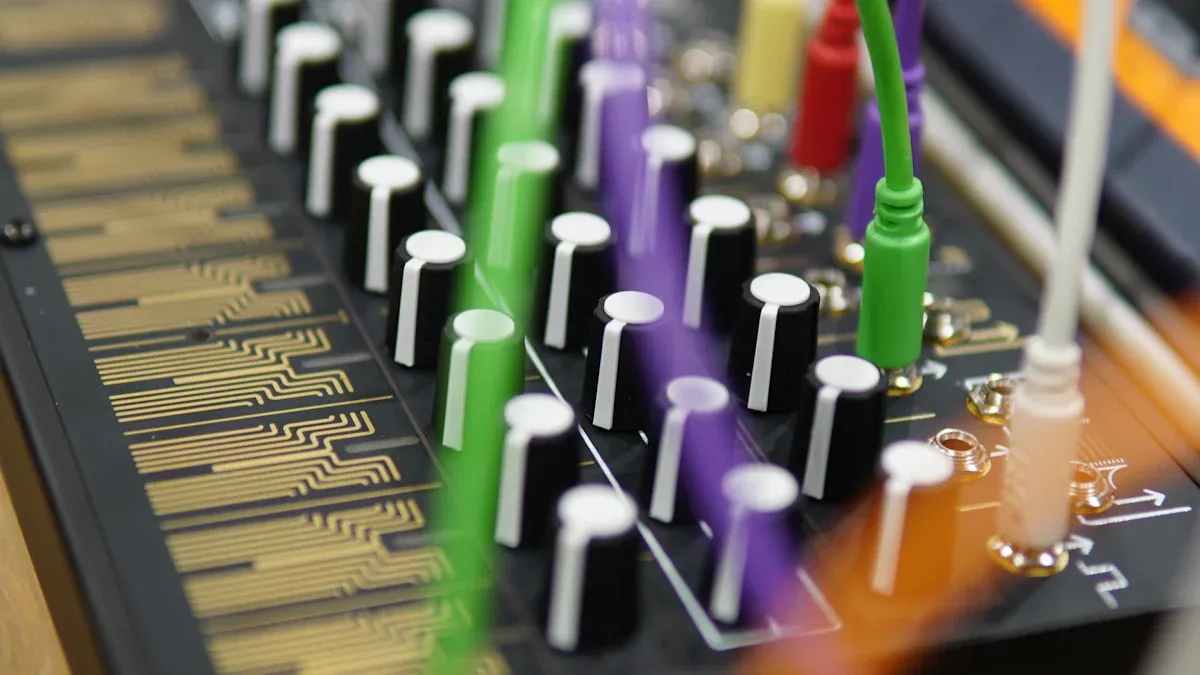
Powertrain Systems
Bourns® surface-mount chip inductors play a vital role in powertrain systems. These systems require components that can handle high currents and operate reliably under extreme conditions. Inductors ensure stable energy delivery to critical components, such as the alternator and starter motor. They also help regulate voltage and suppress electromagnetic interference (EMI), which is essential for maintaining system efficiency.
In hybrid and electric vehicles, inductors contribute to the efficient operation of the battery pack. They optimize energy transfer between the battery pack and the electric motor, reducing power loss and improving overall performance. Their compact design allows engineers to integrate them into space-constrained areas without compromising functionality.
Infotainment and Connectivity Modules
Modern vehicles rely on infotainment and connectivity modules to enhance the driving experience. These systems demand components that can maintain signal integrity and suppress noise. Bourns® inductors excel in these applications by reducing EMI and ensuring stable power delivery.
For example, in a vehicle’s audio system, inductors minimize distortion and improve sound quality. In connectivity modules, they maintain reliable communication between devices, even in high-frequency environments. Their compliance with automotive standards ensures durability and consistent performance, making them a trusted choice for infotainment systems.
Advanced Driver-Assistance Systems (ADAS)
Advanced driver-assistance systems (ADAS) require precise and reliable components to function effectively. Bourns® inductors support these systems by managing power delivery and suppressing noise. They ensure that sensors, cameras, and radar systems operate without interference, enhancing safety and performance.
In ADAS applications, inductors also contribute to the efficient operation of the battery pack. They regulate energy flow, ensuring that critical components receive the power they need. Their robust design and thermal performance make them suitable for harsh environments, where reliability is crucial.
Tip: Engineers designing ADAS should prioritize components that offer high EMI suppression and thermal reliability to ensure optimal system performance.
Electric Vehicle (EV) Charging Systems
Electric vehicle (EV) charging systems rely on advanced components to ensure efficient power transfer and reliable operation. Bourns® surface-mount chip inductors play a critical role in these systems by enabling inductive power transfer (IPT) technologies. These inductors facilitate the conversion of high-frequency alternating current (AC) into direct current (DC), which powers the battery pack during charging.
Inductive power transfer operates through electromagnetic fields generated by the transmitter coil. The receiving coil captures this energy and converts it into usable power. Performance benchmarks highlight the preferred operating frequency range of 79 to 90 kHz, which optimizes power transfer efficiency while minimizing the size of components. This frequency range ensures that inductors can handle high-frequency AC power effectively, making them indispensable in EV charging applications.
Bourns® inductors also contribute to the thermal management of EV charging systems. Their low DC resistance reduces heat generation, enhancing efficiency and preventing thermal stress on the battery pack. This feature is particularly important in fast-charging stations, where high power levels demand robust and reliable components.
In addition to power transfer, these inductors support the battery management system by regulating energy flow and suppressing electromagnetic interference (EMI). This ensures stable operation and protects sensitive electronics within the battery pack. Their compact design allows engineers to integrate them into space-constrained areas, making them ideal for modern EV charging stations.
The versatility of Bourns® inductors extends to wireless charging applications, where they enable seamless energy transfer without physical connections. Their compliance with automotive standards ensures durability and reliability, even in harsh environments. By incorporating these inductors, EV charging systems achieve enhanced performance, reduced energy loss, and long-term reliability.
Tip: Engineers designing EV charging systems should prioritize inductors with proven thermal performance and EMI suppression capabilities to ensure optimal efficiency and reliability.
Selecting the right inductor is crucial for ensuring the efficiency and reliability of automotive systems. Proper inductor selection helps maintain stable voltage output, manage load variations, and minimize ripple voltage, which are essential for optimal performance. Key parameters like inductance, saturation current, and RMS current directly influence the ability of DC-DC converters to deliver clean, efficient power.
Bourns products include surface-mount chip inductors that offer unmatched benefits, such as shielded construction for reduced EMI, low DC resistance for improved efficiency, and high saturation current for handling demanding power applications. Their wide operating temperature range and compliance with automotive standards make them a trusted choice for diverse environments.
For tailored recommendations, engineers should consult technical datasheets or seek expert advice to match specific application needs. Bourns products include surface-mount chip inductors that deliver exceptional performance, making them indispensable for modern automotive designs.
FAQ
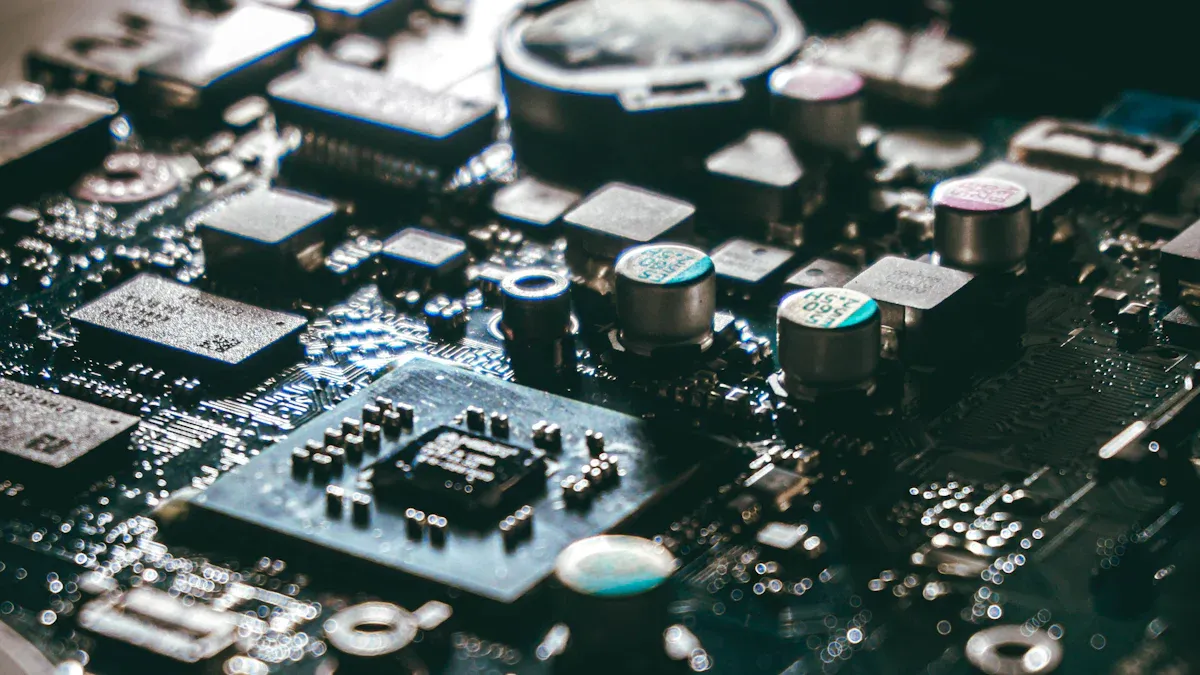
What makes Bourns® inductors suitable for automotive applications?
Bourns® inductors comply with AEC-Q200 standards, ensuring reliability under extreme conditions. Their compact design, high EMI suppression, and thermal performance make them ideal for automotive systems like powertrains, infotainment, and EV charging.
How do Bourns® inductors improve EMI suppression?
These inductors reduce electromagnetic interference by filtering noise in sensitive circuits. Their advanced design minimizes EMI spikes, ensuring stable operation in high-speed communication and power management systems.
Are Bourns® inductors compatible with electric vehicles (EVs)?
Yes, Bourns® inductors support EV applications, including charging systems and battery management. Their low DC resistance enhances efficiency, while their thermal reliability ensures consistent performance in high-power environments.
What factors should engineers consider when selecting an inductor?
Engineers should evaluate inductance value, current rating, physical size, and compliance with automotive standards. Matching these parameters with application requirements ensures optimal performance and reliability.
Where can I find technical support for Bourns® inductors?
Engineers can consult Bourns® datasheets or contact technical experts for tailored recommendations. These resources provide detailed specifications and guidance for selecting the right inductor for specific applications.
Tip: Visit the official Bourns® website for additional resources and tools to simplify the selection process.
See Also
Understanding MC9S12DJ256MFUE Specs for Automotive Uses
Complete Overview of AD1940YSTZ and AD1941YST Automotive DSPs
Unveiling Key Automotive Features of FREESCALE MCF5251CVM140
Three Essential Features of SPC5605BMLL6 and SPC5607BMLL6 ECUs
IRF820 N-Channel MOSFET for Power Management and Control
